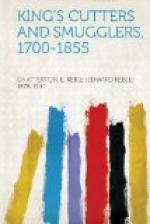It was not merely the tobacco, spirits, and tea which in the early years of the nineteenth century were being smuggled into the country, although these were the principal articles. In addition to silks, laces, and other goods, the number of pairs of gloves which clandestinely came in was so great that the manufacture of English gloves was seriously injured.
In the year 1811 so ineffectual had been the existing shore arrangements that an entirely new plan was inaugurated for suppressing smuggling. The Riding officers no doubt had a difficult and even dangerous duty to perform, but their conduct left much to be desired, and they needed to be kept up to their work. Under the new system, the office of Supervisor or Surveyor of Riding officers was abolished, and that of Inspector of Riding officers was created in its stead. The coast of England was divided into the following three districts:—
No. I. London to Penzance.
No. II. Penzance to Carlisle.
No. III. London to Berwick.
There were altogether seven of these Inspectors appointed, three being for the first district, two for the second, and two for the third. The first district was of course the worst, because it included the English Channel and especially the counties of Kent and Sussex. Hence the greater number of Inspectors. Hence, also, these three officers were given a yearly salary of L180, with a yearly allowance of L35 for the maintenance of a horse. The Inspectors of the other two districts were paid L150 each with the same L35 allowance for a horse. In addition, the Inspectors of all districts were allowed 10s. a day when upon inspections, which were not to last less than 60 days in each quarter in actual movement, “in order by constant and unexpected visitations, strictly to watch and check the conduct of the Riding officers within their allotted station.” Under this new arrangement, also, the total number of Riding officers was to be 120, and these were divided into two classes—Superior and Inferior. Their salaries and allowances were as follows:—
FIRST DISTRICT
Superior Riding Officer L90 Inferior " " 75 Allowance for horse 30
SECOND AND THIRD DISTRICTS




